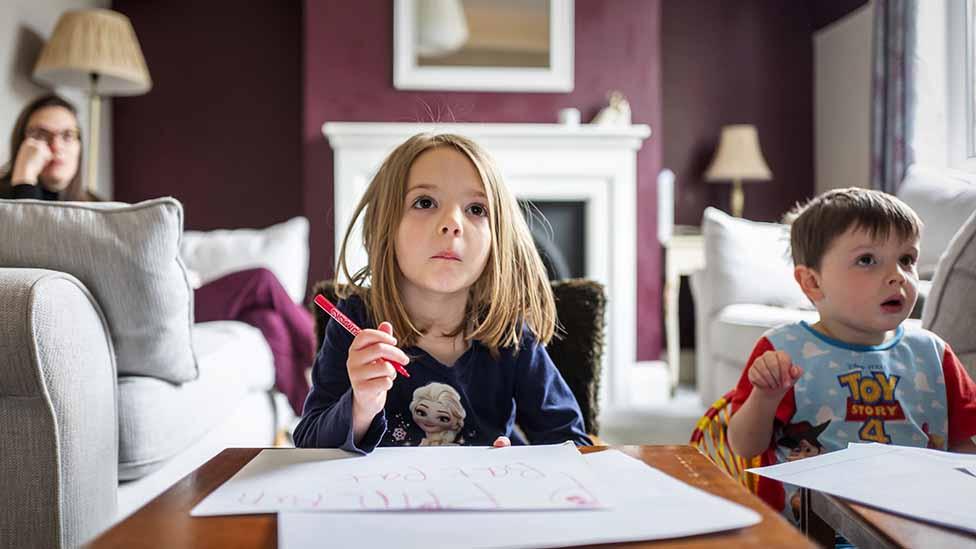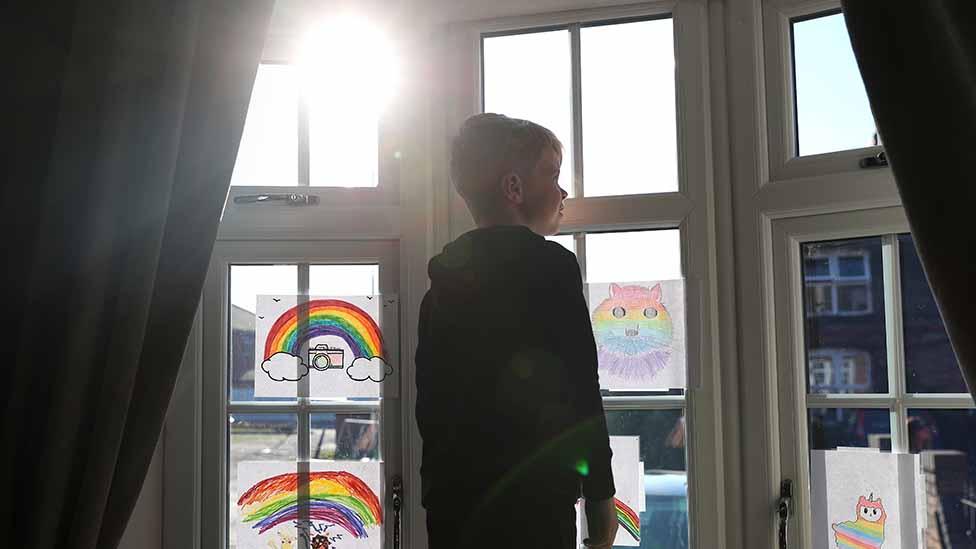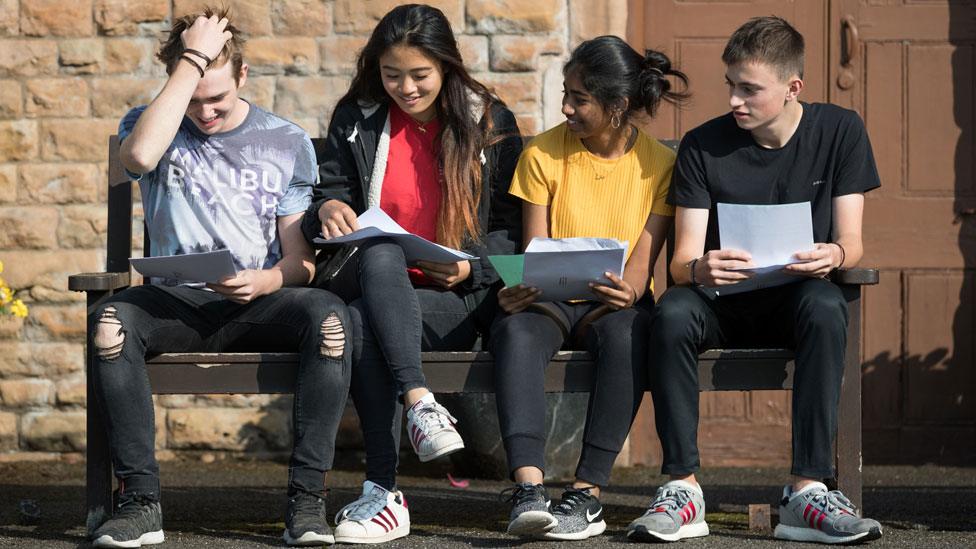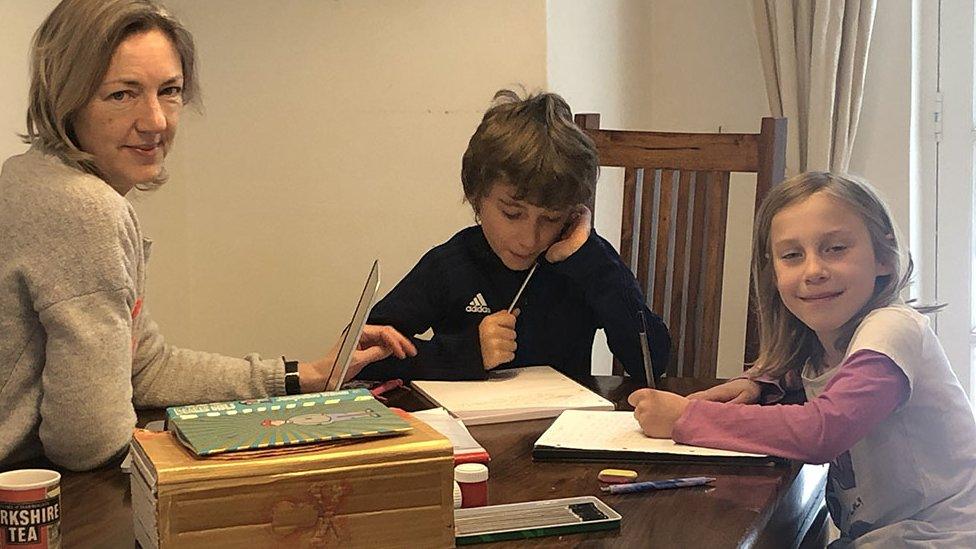Coronavirus: How do I home-school my children and what does Bitesize offer?
- Published

Schools across the UK would normally be opening for the summer term about now.
However, they remain closed to all but a few pupils and there is no current reopening timetable. Most parents are now responsible for their children's education. For many, working from home and supporting their children's school work is not easy.
BBC Bitesize has launched a big push to help children - and parents - with home-learning, but what's realistic, and where can parents find support?
What can parents and children actually do?
First of all, there is little expectation that parents are able to replace teachers.
A joint statement by the main teachers' unions, external said that "we cannot home-school the nation's children". They acknowledged that many parents have their own complicated work patterns.
However, many schools provided learning packs when the lockdown started, and are trying to run some online learning - for this, they are relying on parents being able to supervise their children.
But what is more important, say educationalists, is maintaining a degree of normality, rather than worrying about a child's progress in English or maths.
Home-schooling for now is "about encouraging parents to help their children create regular routines and study habits", says Prof Becky Francis, of the UCL Institute of Education.

A SIMPLE GUIDE: What are the symptoms?
AVOIDING CONTACT: Should I self-isolate?
UK LOOK-UP TOOL: Check cases in your area
VIDEO: The 20-second hand wash

How do I support my children?
"Recreating the school environment is really tricky," says Helena Gillespie, professor of learning and teaching in higher education at UEA.
But there are things she suggests you can do to make the experience relatively rewarding and stress-free:
Set a routine - if possible, have children dressed and breakfasted by 08:30 on weekdays - this will help them adjust when schools reopen
Identify a set time of day when you will help children with projects, and other times when they can do things by themselves
To avoid children losing academic skills they don't practise, including reading, writing and maths, make these the most important daily sessions
What resources are available?
The BBC has expanded content on its education service, BBC Bitesize, to provide regular daily lessons in English, maths and other core subjects.
BBC director general Tony Hall describes it as "the biggest education effort the BBC has ever undertaken". It includes:
Bitesize Daily - six different 20-minute shows, each targeted at specific age groups from five to 14, covering maths, science and English, as well as subjects including history and geography
more than 150 new lessons added every week to the Bitesize website and app
advice for parents on home-schooling, and guides for pupils with special educational needs
for older students, BBC Four is showing evening programmes to support the GCSE and A-level curriculum
specific content for students in Scotland, Wales and Northern Ireland.
The government has also announced that it is backing a new national online school, called Oak National Academy, to provide 180 hours of free lessons a week. It will offer content based on the curriculum, from Reception to Year 10, for teachers to use when planning remote learning. It also says it will help provide laptops and internet connections for some children in Year 10 who do not have access to a computer.
Other resources include YouTube's Free School,, external which offers a range of videos on topics as diverse as the US constitution, coral reefs and the solar system.
And the organisation behind the Ted talks has a division called Ted-Ed,, external full of "lessons worth sharing" from teachers around the globe.

Children are missing social interaction by being away from school
Out of the classroom
Apart from missing lessons, it is important to remember that school has a social function for children. As with adults, children's relationships with their friends are heavily restricted by lockdown regulations.
Keep up communication with the school and encourage children to keep in contact with their friends as much as possible - something with which younger children may need more encouragement and support.
The Children's Commissioner's "digital 5 a day" campaign, external gives tips on how children can connect with each other, and look after their own mental wellbeing.
Try also using this time to help children acquire life skills - such as hanging out the washing or stacking the dishwasher. Make the most of the opportunity to talk to each other more, for example by trying to have lunch together every day.
When will children return to school?
There is currently no timetable for children to return to school in the UK before September, although this has not been ruled out.
A paper by academics at University College London, external recently questioned whether the closure of schools had any impact on controlling coronavirus. One of the authors, Prof Russell Viner, said its value should be weighed against the cost to children's education and mental health.
However, the government's chief medical officer, Prof Chris Whitty, responded that while schools were "not dangerous" for children during the pandemic, the decision to close them would slow the rise of infections.
In a move likely to be watched by other nations under lockdown, Denmark has now become the first European country to start allowing children up to the age of 11 back to school.
How much should we be doing?
Prof Gillespie says that much depends on how young the child is, but "if they can stay focused for between an hour and three hours, a day that would be fantastic".
Guidance from teaching unions suggests children do no more than three hours' work a day.
But Prof Gillespie says parents should not worry too much on how much time the child spends learning: "It's much better to have a really successful hour where the child enjoys their work, then watches telly."
It's important to know when to bail out, she says, if things aren't going well and everyone is getting frustrated, she advises. "Don't beat yourself up - you can pick things up again tomorrow.
"Children won't remember finishing that geography homework, but they will remember how it made them feel and what the vibe in the house was like."
Additional reporting by Ellie Lawrie
- Published17 April 2020

- Published8 April 2020

- Published3 April 2020
